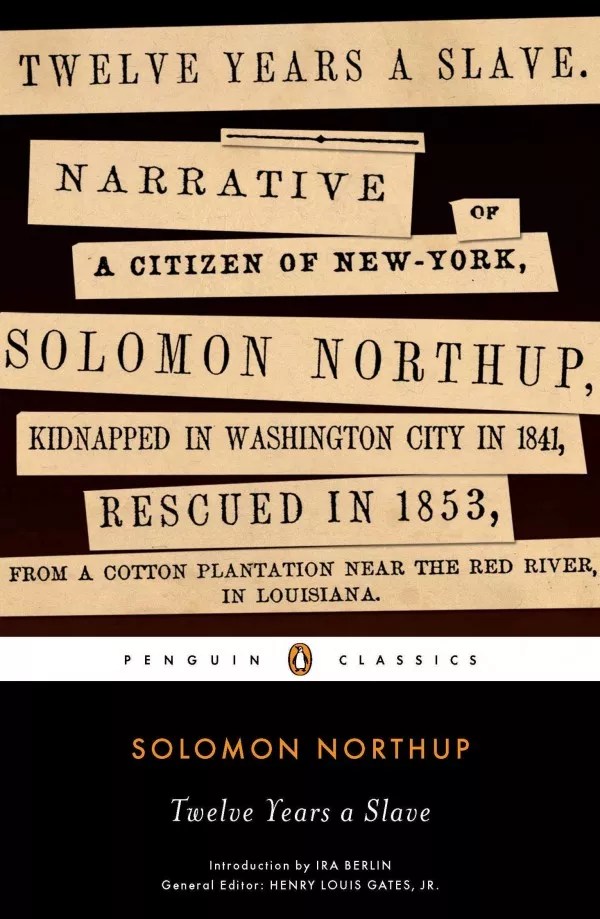12 YEARS A SLAVE (2013, directed by Steve McQueen, 134 minutes, U.S.)
 BY DAN BUSKIRK FILM CRITIC Just the mention of the title 12 Years A Slave has elicited groans when brought up in conversation; either the concept is too weighty, people feel the subject has been covered or they just can’t deal with the reality of American chattel slavery. Beyond the historical guilt and other political ramifications, British director Steve McQueen’s unforgettable exploration of the plantation life is one hell of a character study and a once in a lifetime role for one of our era’s most gifted actors, Chiwetel Ejiofor. Like no previous film on American slavery, McQueen immerses his audience into a society where the crimes at its heart infected everything it touched with injustice.
BY DAN BUSKIRK FILM CRITIC Just the mention of the title 12 Years A Slave has elicited groans when brought up in conversation; either the concept is too weighty, people feel the subject has been covered or they just can’t deal with the reality of American chattel slavery. Beyond the historical guilt and other political ramifications, British director Steve McQueen’s unforgettable exploration of the plantation life is one hell of a character study and a once in a lifetime role for one of our era’s most gifted actors, Chiwetel Ejiofor. Like no previous film on American slavery, McQueen immerses his audience into a society where the crimes at its heart infected everything it touched with injustice.
McQueen makes the landscape of America into an alternate universe where the most grotesque violent crime against men, women and children could be carried out publicly for all to witness and not a single voice would protest. But we know that this reality (whose horrors are too deep to really conjure) did exist, giving the experiences of the lead character’s journey a throbbing urgency. Although the crimes portrayed are almost unfathomably brutal the film is not an unwatchable torture-fest but an epic survival story, with its main character not just looking to escape his captors but an entire society.
The British actor Chiwetel Ejiofor (perhaps best known in the States for his turn in the dystopia drama Children of Men)  is Solomon Northup, a free man who makes his home in Saratoga, New York in 1841. He makes a comfortable living for his wife and children playing his violin but after accepting an engagement in Washington D.C. he finds himself kidnapped and sold into slavery. Solomon changes hands a few times before ending up at the plantation of Edwin Epps (Michael Fassbender,) a disturbed man renowned for breaking the spirit of his slaves. McQueen sinks us deeply into Solomon’s world, with Ejiofor’s deeply emotive eyes and stifled voice lending an unusually experiential quality to the film.
is Solomon Northup, a free man who makes his home in Saratoga, New York in 1841. He makes a comfortable living for his wife and children playing his violin but after accepting an engagement in Washington D.C. he finds himself kidnapped and sold into slavery. Solomon changes hands a few times before ending up at the plantation of Edwin Epps (Michael Fassbender,) a disturbed man renowned for breaking the spirit of his slaves. McQueen sinks us deeply into Solomon’s world, with Ejiofor’s deeply emotive eyes and stifled voice lending an unusually experiential quality to the film.
Solomon finds himself in a comparatively kinder world with his first slave holder, William Ford (Benedict Cumberbatch,) who encourages Solomon to use his knowledge and skills in digging a barge channel to move goods. But one of the insidious consequences of slavery is that men and women who show their intelligence threaten white racists’ perceptions of their own superiority. Paul Dano is memorable as one such man, a plantation overseer who is disturbed to find an educated slave in his midst. The film reaches into some of the deeper injuries of living as an oppressed class, where exhibiting skills and accomplishing achievements provokes violent reaction. Dano, so good at playing flawed men, is particularly convincing as the sniveling coward who carries out punishments against slaves who show themselves as anything but servile drones.
As Solomon loses himself deeper and deeper into this nightmare, the road signs of time and place melt and we increasingly find ourselves in situations only half explained, just as the slaves might be thrust into situations without consultation or explanation. This feeling of hopelessness is one of the hardest crosses the film makes its audience bear. With no one to trust and no avenue to turn we’re left to withstand whatever morbid whim the slave master can imagine. If the film’s title didn’t give us a sense that this nightmare had an ending for Solomon Northup, I’m not sure if 12 Years would be bearable for audiences.
Slavery, like the genocide of the American Indian, holds an odd place in the nation’s subconscious; it’s a story everyone knows yet it seems forever on the back burner of the country’s mind. In the last forty yeas there’s been nearly as many films about the Manson Family murders as there have been about the institution of slavery. The audience at the screening I attended was overwhelmingly African American, making me curious about what factions in modern America are ready to face this part of our nation’s history. For his part, McQueen has made a document so compelling it qualifies as one of the must-see films of the decade. With myths like “the caring slaveowner” and Gone With The Wind standing so prominently, 12 Years A Slave is a perfect point-of-reference for our society to share. As the nation continues to negotiate the ramifications of the soul-killing institution of slavery, it would be helpful to have such a common point of unflinching honesty.

